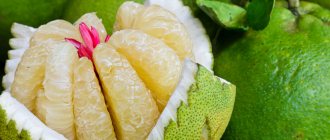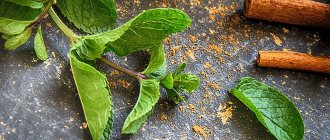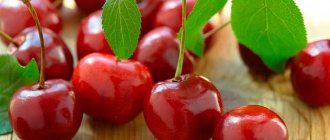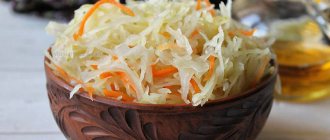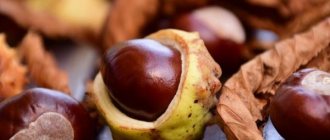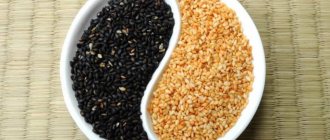Good day. Have you ever heard of ordinary things with extraordinary properties? Many of them surround us, and we even eat some of them. But eating an ordinary product with unusual satisfaction can only be done “with skill.” Therefore, today we will talk about the beneficial properties of table beets. I assure you, it will not only be good for your health, but also exciting. You will also find educational videos along the way.
Probably many of us had to peel beets ourselves. And what were your hands like after that? That's right - blood red. Some even consider such consequences to be one of the main disadvantages of beets. But scientists say just the opposite. In fact, the burgundy pigment, which is so difficult to wash off our hands, is precisely what determines the main advantages of table beets. But first things first…
Composition and beneficial properties of beets
Nutritional value of beets
The calorie content of beets is small - 43 kcal/100 g. product. There is negligibly little fat in it - 0.17 g. And the proteins are only 1.61 grams. But beets contain a decent amount of carbohydrates - 6.76 grams. At the same time, the composition of its carbohydrates is represented by sucrose and fructose, which can reach up to 10% by weight. This makes beets one of the most sugar-rich vegetables. And only other types of beets can compete with it here.
Beet vitamins
Recent research has shown that beets are particularly rich in vitamin B9 or folic acid. In fact, folic acid is the main vitamin in beets. Its content in beets is 109 mcg, which is 55% of the daily requirement of an adult. Thus, beets, along with peanuts, sunflower seeds, soybeans and parsley, are among the top 10 foods for folic acid content.
Folic acid belongs to the category of vital vitamins and its increased content largely determines the beneficial properties of beets.
Firstly, folic acid is actively involved in the process of division and formation of new healthy cells. So, in terms of their properties, the folates that make up this vitamin are similar to the building blocks that are used to create the necessary genetic code of the cell.
With a lack of such “building blocks,” important organs and tissues that need frequent renewal suffer first. For example, cells of the bone marrow, skin, immune system, mucous membranes.
It’s not for nothing that B9 is the main vitamin for expectant mothers.
Secondly, as a result of research from 2003 to 2008, a connection was established between mental health and the presence of B9 in the body. That is, scientists have identified the positive effect of folic acid on the state of the human brain and nervous system.
Thirdly, folic acid is directly involved in hematopoiesis and blood renewal.
The second important vitamin of raw beets is vitamin C. Its amount is 10 mg, about 14% of the daily value. For comparison, the content of this vitamin is the same in apples.
Vitamins E, B1, B2, B3, B6 are also present, but not in significant quantities. Vitamins C and E are antioxidants, prevent aging and have antitumor properties.
Macro and microelements of beets
Beets contain the following minerals, in descending order: potassium, iron, magnesium, phosphorus and calcium.
All these are alkaline substances, which primarily have a general healing effect on our entire body.
Of the macroelements (in 100 grams of vegetables), the highest potassium content is 325 mg - 16% of the daily dose. And the least is calcium 16 mg - 2%.
As for microelements, such a rare element as vanadium also plays an important role in the composition of beets.
For example, 100 gr. Vegetables can completely saturate the body’s daily need for this microelement.
Vanadium has positive properties for the formation of bone tissue, affects the composition of the blood and increases the ability of phagocytes to absorb foreign viruses and bacteria. It also participates in hematopoiesis.
It is also worth mentioning chromium (40%) and manganese (33%) contained in beets. Chromium affects longevity, and manganese is involved in the healing of damaged tissues, including joints.
In addition, this vegetable, common to us, contains copper (14%), zinc (4%) and even iodine (5%). For such a rare trace element as iodine, this is quite decent.
Finally. Other rare metals found in beets include rubidium, cesium, molybdenum and cobalt. The health value of which has not yet been sufficiently studied.
Other Important Components
Betaine
Some people may even think that burgundy beets actually contain blood. In fact, this vegetable owes its color to a specific pigment, betaine.
This vitamin-like substance, along with folic acid, actively affects the beneficial properties of beets.
- For example, it acts as an active protector of the inner lining layer of blood vessels from damage.
- Some scientists believe that betaines are the reason beets suppress cancerous tumors.
- In addition, betaine is known to have positive effects on liver health.
- Finally, betaine can compensate for some of the lack of vitamin B12 in the human body. Which is good news for vegetarians.
Cellulose
Forms proper stool and promotes the rapid passage of food through the gastrointestinal tract.
One of its components, pectins, bind toxic substances in the intestines and promote the removal of radionuclides from the body.
Nutritional value and calorie content of beets
The nutritional value of beets is as follows:
- proteins – 14.3%;
- fats – 2.1%;
- carbohydrates – 83.6%.
The calorie content of the product depends on the variety and method of preparation of the vegetable. The table shows the average caloric value for various processing methods:
| Cooking method | Calorie content, kcal/100 g |
| No processing | 43 |
| Boiled/steamed | 44 |
| Baked | 39 |
| Stewed | 106 |
How are beets beneficial for the body?
Let's look at what exactly the benefits of beets are for humans and for what diseases they are indicated.
Anemia remedy
This effect of beets was first noticed by Dr. Schneider.
Although the content of iron and vitamin C in beets, which facilitates its absorption, is modest enough to determine the antianemic effect. But the fact remains a fact. And scientists are still wondering what unknown components so strongly stimulate the process of hematopoiesis (the creation of new healthy blood cells). Folic acid probably plays an important role here.
For example, drinking raw, freshly squeezed juice from 50 to 100 g. before meals, twice a day, in this case, has an excellent effect. Beetroot juice is especially recommended for patients who have had a bad reaction to treatment with iron-containing medications. This phenomenon is common in hypoplastic anemia.
Anticarcinogenic effect
Dr. Schneider refers to various experiments conducted in Hungary and Germany. Cancerous tumors decreased or disappeared completely after patients began to receive 250 grams daily. grated beets or 300 - 500 ml. beet juice.
The effect persisted even after the juice was boiled to make it more tolerable to the stomach.
Alkalinization of the body
The high level of mineral salts that make up beets, including potassium, calcium and magnesium, explain its alkalizing effect on the blood. Thus, beets are highly recommended in cases of gout, increased concentration of uric acid in the blood.
It is also indicated for a diet with a large amount of fat and a small amount of vegetables.
About the danger of acidification of the body here.
Reducing cholesterol
The hypolipidemic (reducing fats in the blood) effect of beets is explained by the content of plant dietary fiber in it - fiber. Since fiber not only greatly facilitates the work of the intestines, but also reduces the amount of cholesterol absorbed into the blood.
Blood pressure regulation
Beets contain nitric acid salts, which, as a result of conversion to nitric oxide, are actively involved in the mechanism of vasodilation. Thus, in places where increased blood flow is required, the diameter of the vessels simply increases, and the need to increase blood pressure disappears. This effect is especially valuable for hypertension. At the same time, the load on the heart is reduced.
Other beneficial properties of beets
In addition, the benefits of beets are manifested in:
- prevention of constipation. The mild laxative effect of this vegetable is due to the presence of the same fiber in it.
- appetite stimulation. So beets increase the production of gastric juice.
- improving liver functionality
- strengthening the immune system
- increase in hemoglobin
Watch an interesting video about the beneficial properties of beets:
Healthy recipe from beets
Cut 1.5 kg of peeled beets into 4-5 pieces each and add 2 liters of hot water. cook for 1 hour over medium heat. After an hour, add 1 tbsp sugar and 1 tbsp. apple cider vinegar. Keep refrigerated.
Before each meal, drink 30-40 ml of beetroot infusion 3-4 times a day and eat 1-2 pieces of beets.
This recipe
- improves blood quality
- cleanses the body
- has a laxative, diuretic effect, cleanses the liver
- has an anti-cancer effect - blocks the growth of cancer cells
- enhances the function of the sex glands, treats sexual impotence
- increases the body's endurance
- enhances the absorption of oxygen by body tissues
- improves the functioning of the entire cardiovascular and respiratory systems
- reduces blood pressure
- reduces the risk of developing vascular atherosclerosis, heart disease, type 2 diabetes, osteoporosis
- rejuvenating effect - contains substances that promote the creation of new cells
- dramatically reduces menopause symptoms
- “cold feet” syndrome goes away due to the vasodilator effect
- helps strengthen arteries, capillary walls, ligaments and bones
- useful for exhaustion of the body and loss of strength
- Prevents obesity (especially fatty liver).
Benefits of beets for women?
In addition, ladies will be interested to know that beets have a positive effect on appearance:
- Moisturizes the skin and gives it a healthy look
- Eliminates brittle nails
- Strengthens hair ends and gives them a healthy shine
And here vitamin B9 and betaine jointly exhibit their rejuvenating properties in beets.
It is not without reason that betaine is actively used in cosmetics for hair and skin care.
Dishes made from beets (especially raw ones, recipes below) can be actively used in diets for losing weight and improving your figure. Agree that even sweet beets are much inferior to cloyingly sweet and high-calorie confectionery products. Read about sugar and my personal experience here.
In fact, table beets are an assistant in the fight against the negative manifestations of premenstrual syndrome. Which can manifest itself in irritability, insomnia and mood swings. Scientists say that a deficiency of vitamin B9 may be to blame.
As you know, during menstruation a woman experiences blood loss. And the beneficial properties of beets are expressed in the formation of new healthy blood. Thus, consuming this root vegetable prevents anemia.
Research also revealed the properties of beetroot (in particular betaine) that prevent breast cancer.
During pregnancy and lactation
As you know, the female body during and during breastfeeding experiences an increased need for many nutrients. So, beets are an excellent product for pregnant and lactating women:
- An affordable source of essential minerals in a complete package.
- Rich supplier of folic acid. On which the development of many organs and systems of the embryo and baby depends without dangerous deviations. Vitamin B9 also affects the successful bearing of a child.
- A remedy for psycho-emotional balance.
Which is healthier: raw or boiled beets?
Since the composition of the root crop remains virtually unchanged during heat treatment, we can say that there is practically no difference between them. However, when boiled, the product has several features that make its use “softer” and slightly expand the scope of application. Boiled beets are less chemically active and do not irritate the mucous membranes as much.
Due to the binding of sugars when cooking a vegetable, its glycemic index becomes approximately twice as high (from 30 it rises to 65), however, given that the total number of carbohydrates in the product is small, this does not affect its use for diabetics. The glycemic load per unit mass of beets remains one of the lowest, and the main limitation of the daily dose for this category of people lies in the completely different properties of beets - the effect of fiber on the gastrointestinal tract and acid composition on metabolism.
Benefits of beets for men?
As we have already said, this ordinary vegetable contains rare trace elements and minerals that have a remineralizing and alkalizing effect on the body. This effect also prevents active hair loss and graying in adulthood. Since the body additionally needs micro and macroelements to “maintain” them.
For men, beets can also be useful as:
- Prevention of strokes and heart attacks. This strengthens blood vessels and reduces cholesterol levels in the blood.
- Means to increase endurance and strength. Beetroot betaine helps build muscle mass. And the vegetable itself renews blood saturated with hemoglobin.
- A product that has a positive effect on the performance of joints.
- Prevention of prostate cancer.
- Stimulates the production of active and healthy sperm and improves sexual function
At what age can beets be given to children?
Given the high allergenicity of the vegetable, it is one of the last to be introduced into vegetable complementary foods. The minimum age when the digestive system is able to digest it is 7-8 months. At this age, children are given it in the form of puree.
Recommended reading: Benefits of broccoli
Before this, the beets should be thoroughly boiled, for at least an hour and a half, and then grated. Kids don’t really like the taste of beets, so it is recommended to give it to children mixed with boiled cabbage and potatoes (in equal proportions).
Complementary feeding should start with half a teaspoon. If allergic reactions occur, stop immediately. However, beets must be introduced into the diet, so after a month you need to try giving complementary foods again.
Important! If allergic reactions do not go away within a year, then further intake of beets should be carried out only after consultation with a pediatrician or doctor.
Starting from the year when children have a sufficient number of teeth, it is allowed to give beets in the form of a vinaigrette or in the form of cubes, seasoned with sour cream with added sugar.
The benefits and harms of beets
So, in the previous sections we looked at the amazing properties of beets. Of course, the benefits of this vegetable are enormous, but beets can also cause harm. Let's look at some restrictions on its use.
Of course, for a healthy person, beets do not have any contraindications.
However, negative consequences when consuming large quantities of this vegetable (over 1 kg) can be diarrhea and intestinal disorders (gas formation and discomfort).
At the same time, the main contraindications of beets are determined by the following diseases:
- Allergic reactions
- Urolithiasis disease
- Low pressure
In all of the above cases, caution should be exercised in consuming beets. It's better to consult a doctor.
Contraindications to treatment with red beets
An overdose of fresh beet juice can cause spasm of the blood vessels of the brain, and this is fraught with the most serious consequences. In the presence of other concomitant diseases (hypertension, heart disease, tachycardia, etc.), such a reaction can be life-threatening.
Therefore, it is very important not to endanger your health and defend the beet juice after squeezing. Those who have a weak stomach should not overuse beets. Gastritis with high stomach acidity should also be a contraindication for the use of red beets for treatment.
The content of oxalic acid in red beets requires restrictions on its use for people with urolithiasis and other metabolic disorders in the body.
Be healthy!
How to eat beets?
Raw beets and their benefits
Of course, to reap all the beneficial properties of beets, you need to eat them raw.
But for this you need to get used to it. If there are no serious problems with the stomach and intestines, then raw beets will be the best choice for your health.
Here are some interesting recipes for healthy raw beet salads:
Simple but healthy salad
- Grated beets
- Chopped walnuts
- Greens (dill, parsley, cilantro, arugula)
- Season with vegetable oil.
- For piquancy, you can add lemon juice and zest.
- A little salt (optional)
- Avocado slices (optional)
Treatment of runny nose and sore throat with beets
The root vegetable will also help cure a runny nose, sore throat and inflammation of the tonsils; it is enough to apply it in accordance with the recipe of traditional medicine in order to fully recover in a couple of weeks.
- To get rid of a runny nose, you should grate the beets on a fine grater, then squeeze them out with gauze, and put the resulting liquid in a warm place for a couple of days. Then this fermented juice should be instilled into each nostril, 2-3 drops three times a day. Reviews indicate that this treatment will clear up a runny nose within 5 days.
- Treating a sore throat with raw beets, which you can simply chew, helps. If this does not help, you can make an infusion for gargling, which is obtained by mixing one glass of beet juice, cranberry juice, vodka and honey. This infusion should stand for three days, and then it should be taken a tablespoon four times a day. Judging by the reviews, after a week of such treatment there will be no trace of the disease left.
- To get rid of inflammation of the tonsils, you should wash the beets and grate them on a coarse grater along with the peel. Then pour this paste with five glasses of water and let it simmer for an hour over low heat. After this, filter the liquid, let it cool, and you will need to gargle with this every time after eating.
Is it possible to eat raw beets every day?
As such, there is no prohibition on the daily consumption of a raw product, but we should not forget that the regular cleansing of the body that occurs when consuming it is not beneficial.
Ultimately, everything is determined by the daily dose of the product. If you eat 100-150 g of vegetables every day, it will not cause any harm to the body. “Shock” doses of beets, used, for example, during periodic cleansing of the body or diets, naturally, should be daily for a limited time (from 3 to 7 days), after which fairly long pauses are recommended in the use of this product - from 1-2 weeks to 3 months.
How to properly store and select beets
The choice of beets is made both by external and internal characteristics - it is advisable to cut the root crops before purchasing in order to assess the quality of the pulp and its structure. The root vegetables themselves should be firm and elastic. If they are soft, this may indicate a violation of storage conditions or even the fact that the vegetable is freezing.
The smell of the root crop should be characteristic of beetroot, without signs of rotting. There should be no black ulcers or a large number of small spots on the root vegetables or inside them. There should also be no voids in the vegetable.
The cut of the root crop should be juicy, with a rich red or red-violet color. However, excessively pronounced colors may indicate uncontrolled use of fertilizers. It is advisable to additionally test such vegetables for the presence of nitrates.
Root vegetables are stored in a refrigerator or in a basement at a temperature of 0 to +2 °C. Exceeding the temperature above +4 ° C leads to the germination of the vegetable. In the refrigerator, beets are stored in a plastic bag, in the basement - in boxes with good air ventilation to avoid rot.
Indications for use
The root vegetable is useful in any form, but boiled beets are better absorbed and will not harm people with gastrointestinal disorders.
Properties for the treatment of various diseases
Beets have a healing effect on almost all organs and systems of the body due to the variety of beneficial microelements that are not found in other vegetables:
- Stomach and intestines . The pectin contained in the root vegetable restores intestinal motility and activates bile. By eating beets, you can cure peptic ulcers.
- Liver . The root vegetable prevents harmful elements from entering the liver and improves the functions of the organ. Normalizes the functioning of the pancreas, removes unnecessary salts and heavy metals.
- Thyroid gland , restoring its function.
- Circulatory system - beets thin the blood and remove excess cholesterol from it.
Beetroot prevents the development of oncological processes in the colon , prevents the development of atherosclerosis, ischemia, and hypertension. Strengthens the heart muscle, fights vitamin deficiency, and activates the protective functions of the immune system.
Therapeutic effect for various organs and systems of the female body
A woman's health is related to hormones . It is important to avoid hormonal imbalance. The entire hormonal background of the body depends on the condition of the intestines, as well as its microflora.
The intestines synthesize about 90% of all hormones, so it is important to include red beets in your daily diet . The combination of folic acid and valine (an amino acid) helps stabilize hormonal levels.
For editing. A lack of folic acid in women can be seen in premenstrual syndrome. Manifests itself in the form of irritability, mood swings, and insomnia. Beetroot will help ease the symptoms of PMS.
During menstruation, the root vegetable promotes the process of hematopoiesis and minimizes the risk of anemia due to its high iron content.
Zinc, which is part of the vegetable, ensures the duration of insulin action.
Systems affected by the therapeutic effect:
- Immune . A complex of vitamins and minerals ensures the maintenance of immunity. In particular, arginine is responsible for strengthening the body’s defenses (it also has anti-cancer activity).
- Cardiovascular . Flavonoids are responsible for lowering blood pressure, strengthening the walls of blood vessels, and improving blood composition. Iodine - prevention of the development of atherosclerosis. The benefit of oleanolic acid is to stimulate the heart muscle. Betaine lowers blood pressure, removes cholesterol and prevents the formation of blood clots.
- Digestive . An important digestive enzyme is betaine. It absorbs components in food, speeds up metabolism, stimulates liver function and removes waste from the body. Organic acids promote normal digestion of food. Dietary fiber enhances peristalsis and fights constipation, and pectin normalizes intestinal microflora.
- Nervous . The amino acids valine and folic acid strengthen the nervous system.
- Eyes . Nitric acid salts help preserve visual acuity and strengthen corneal cells. Zinc is responsible for preventing retinal detachment.
For reference. Betaine provides the bright red color of beets.
The healing properties of the root vegetable also extend to the beauty of skin and hair . Unsatisfactory skin condition is the result not of cosmetic problems, but of improper functioning of organs. Zinc will help make the skin firm and elastic, get rid of acne, warts, and peeling. Folic acid can improve skin regeneration at the cellular level. It also eliminates dandruff and eliminates the problem of oily skin and hair.
As a bonus, the benefits of root vegetables for weight loss . The low calorie content and satiety of the product will allow you to get rid of extra pounds by replacing one of your meals with boiled beets.



